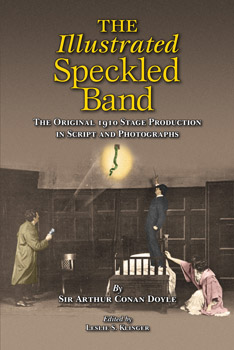I recently acquired a copy of The Illustrated Speckled Band. Why did I wait so long?
Including his starring role in the famous William Gillette play, Saintsbury played Holmes on stage about 1,400 times. Harding reprised his role as the villainous Roylott in the 1930 film version of The Speckled Band, with Raymond Massey as Holmes, then graduated to playing Moriarty against Arthur Wontner’s Holmes in The Triumph of Sherlock Holmes in 1935.
The Illustrated Speckled Band includes a contemporary review of the play that lauds Conan Doyle as a dramatist “who has the gift of characterization, crisp dialogue, and telling situations.” And all that is true! Although I’d read it before, I’d forgotten that it’s simply a wonderful play, with some great lines. For example:
Watson is newly engaged, and Holmes asks what Miss Morstan would say about him going with Holmes on a dangerous quest. “She would say that a man who deserts his friend would never make a good husband,” Watson responds.
There is some great humor—mostly at Watson’s expense. Such as:
HOLMES: An inquest, was it not, with a string of most stupid and ineffectual witnesses?
WATSON: I was one of the witnesses.
HOLMES: Of course—so you were, so you were.
Holmes in disguise as a workman complains about the mess that is 221B. “I’ve ’eard say he was as tidy as any when he started, but he learned bad ’abits from a cove what lived with him. Watson was his name.” “You impertinent fellow!” the doctor explodes. “How dare you talk in such a fashion. What do you want?” But by this time Holmes has slipped into his bedroom to remove the disguise. Wasn’t that episode inserted into one of the Basil Rathbone films?
The play includes Billy the page (a creation of William Gillette), Charles Augustus Milverton, an Indian servant named Ali, and a delightful local rustic called Mr. Armitage.
An example of ACD’s crisp dialogue comes at the end in an exchange that doesn’t appear in the short story. “The brute is dead,” Watson says, looking at the snake. “So is the other,” Holmes replies, meaning Rylott. Then he assures his client, “Miss Stonor, there is no more danger for you under this roof.” Curtain!

Excellent scholarship and research, as always, Dan. Thank you.
ReplyDeleteThanks, "Hans"!
ReplyDelete